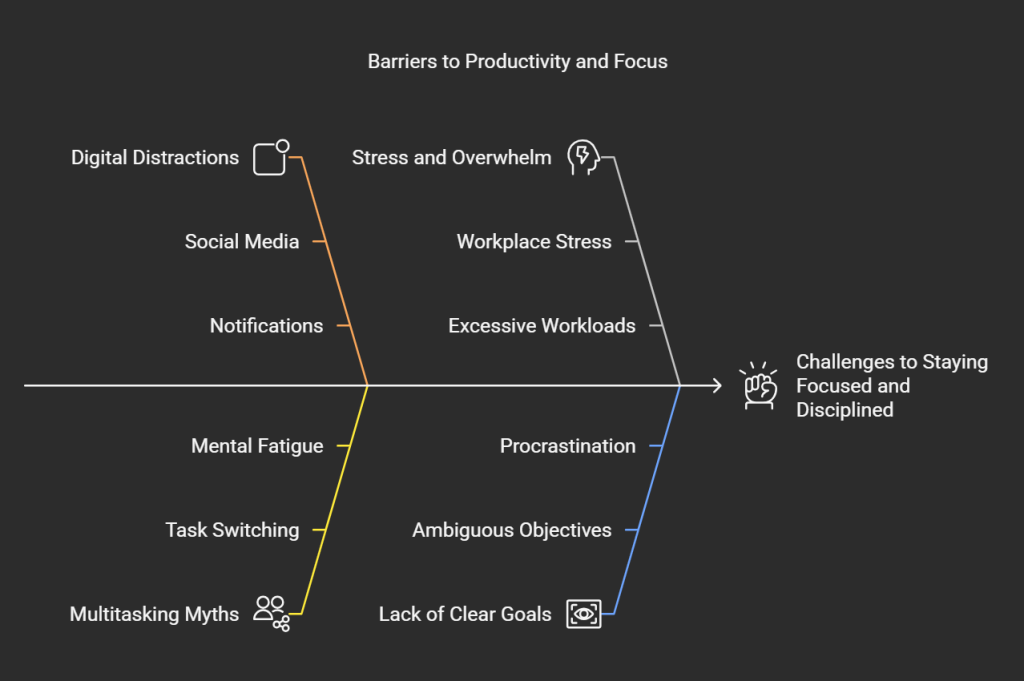10 Ways to Stay Focused and Disciplined at Work: Strategies, Tools, and Long-Term Habits

The Science Behind Focus and Discipline
Understanding the mechanisms of focus and discipline can empower you to work smarter. Focus refers to your ability to direct attention to a specific task, while discipline is the commitment to consistently do what needs to be done, even when motivation wins.
How Attention Works

Your brain's prefrontal cortex governs focus and self-control. However, it has limited bandwidth and is susceptible to distractions. When you multitask or switch between tasks frequently, your brain experiences “cognitive load,” which reduces efficiency.
The Role of Dopamine and Willpower
Dopamine, often called the "motivation molecule," plays a significant role in staying disciplined. When you achieve small wins, your brain rewards you with dopamine, reinforcing positive habits. However, willpower isn’t infinite—it depletes as the day progresses. This phenomenon, known as “decision fatigue,” highlights the importance of structuring your day to prioritize demanding tasks earlier.
Key Takeaway
Focus and discipline are skills, not innate traits. By understanding their biological and psychological foundations, you can create an environment that supports your goals.
Common Challenges to Staying Focused and Disciplined
Before diving into solutions, it’s essential to identify the barriers that derail productivity. Once you understand what’s holding you back, you can address these issues head-on.
1. Digital Distractions
Social media, instant messaging apps, and endless notifications are among the biggest culprits. Studies reveal that it takes an average of 23 minutes to regain focus after an interruption.
2. Multitasking Myths
Contrary to popular belief, multitasking diminishes productivity. Switching between tasks reduces efficiency and increases mental fatigue.
3. Stress and Overwhelm
Workplace stress, unrealistic deadlines, and excessive workloads can make it challenging to concentrate. Chronic stress affects your ability to prioritize and stay disciplined.
4. Lack of Clear Goals
Without clarity, it’s easy to feel lost or demotivated. Ambiguous objectives often lead to procrastination.
Effective Strategies to Boost Focus at Work
Improving your ability to concentrate requires a combination of practical tools and behavioral adjustments. Here are proven strategies:
1. Set SMART Goals
SMART goals (Specific, Measurable, Achievable, Relevant, Time-bound) provide clarity and direction. Break larger projects into smaller, actionable steps.
2. Adopt the Pomodoro Technique
Work in focused intervals, typically 25 minutes, followed by a 5-minute break. This technique keeps your brain engaged while avoiding burnout.
3. Create a Digital Detox Zone
Establish boundaries for tech usage. Turn off notifications, use “Do Not Disturb” mode, or rely on apps like Forest that encourage focus.
4. Optimize Your Workspace
A clutter-free, well-lit, and ergonomically designed workspace can significantly boost your concentration. Incorporate natural light and minimize background noise.
Proven Techniques to Cultivate Discipline
Discipline isn’t just about working harder—it’s about working smarter and maintaining consistency.
1. Habit Stacking
Leverage existing habits by adding new behaviors. For instance, pair your morning coffee with writing your to-do list.
2. Use Accountability Systems
Share your goals with a colleague or use apps like Todoist to track progress. External accountability can motivate you to stay on course.
3. Reward Yourself
Celebrate small wins to reinforce positive behavior. For example, treat yourself to a break or a favorite snack after completing a challenging task.
4. Practice Mindfulness
Mindfulness techniques like deep breathing and meditation improve focus and reduce stress. Apps like Headspace and Calm offer guided sessions tailored for the workplace.
Tools and Resources for Focus and Discipline
Harnessing the right tools can make a world of difference in maintaining productivity and discipline. Here are some top recommendations:
1. Productivity Apps
- Notion: For organizing tasks and projects.
- Trello: A visual task management tool ideal for team collaboration.
- Todoist: A simple yet powerful to-do list app.
2. Focus Tools
- Forest: Gamifies focus by growing virtual trees as you work distraction-free.
- Cold Turkey: Blocks distracting websites during work hours.
3. Books on Productivity
- "Atomic Habits" by James Clear: Explains the science of building and sustaining habits.
- "Deep Work" by Cal Newport: A guide to mastering focus in a world full of distractions.
The Role of Mindset in Achieving Focus and Discipline
A strong mindset is the cornerstone of productivity. Without the right mental approach, even the best tools and strategies will fall short.
1. Adopt a Growth Mindset
View challenges as opportunities to grow rather than setbacks. This perspective fosters resilience and perseverance.
2. Find Your "Why"
Intrinsic motivation—driven by personal values or long-term goals—is more sustainable than external rewards. Reflect on why your work matters.
3. Visualize Success
Visualization techniques can help you stay committed. Picture yourself completing tasks and reaping the rewards of your hard work.
Sustaining Long-Term Focus and Discipline
Short-term success is great, but consistency is key. Here’s how to maintain focus and discipline over the long haul:
1. Adapt to Changes
Flexibility is crucial in dynamic workplaces. When priorities shift, reassess your goals and adjust your approach.
2. Reflect and Refine
Regularly evaluate your progress. Use tools like journals or apps to identify what’s working and what isn’t.
3. Embrace Failure
Setbacks are inevitable. Instead of dwelling on mistakes, treat them as learning opportunities and refine your strategies.
Common Mistakes to Avoid
Even with the best intentions, certain pitfalls can derail your progress. Avoid these mistakes to stay on track:
1. Overcommitting
Taking on too much leads to burnout and decreased productivity. Learn to say no and focus on high-priority tasks.
2. Ignoring Breaks
Skipping breaks might seem productive, but it leads to mental fatigue. Incorporate regular breaks to recharge.
3. Neglecting Health
Physical and mental well-being are essential for focus. Ensure you get enough sleep, exercise, and maintain a balanced diet.
FAQs
1. Why is staying focused so difficult?
Modern workplaces are filled with distractions, from digital notifications to multitasking demands. These interruptions strain your brain's capacity to concentrate.
2. How can I build discipline at work?
Start small by developing manageable habits, track your progress, and use accountability systems. Rewarding yourself for milestones also helps.
3. Are there tools to help me focus?
Yes! Apps like Forest and Cold Turkey block distractions, while tools like Trello and Notion help organize tasks.
4. What’s the role of mindfulness in productivity?
Mindfulness reduces stress, improves emotional regulation, and enhances focus. Practices like meditation can significantly boost productivity.
5. How do I handle workplace interruptions?
Set boundaries by communicating your focus hours with colleagues. Use noise-canceling headphones and schedule dedicated time for responding to messages.
6. Can focus and discipline be improved over time?
Absolutely! With consistent practice, mindset shifts, and the right tools, you can train your brain to stay focused and disciplined.
All Categories
Recent Posts
The quality role of the construction in project
Which allows you pay down construction bills
MON-SAT 8:00-9:00
+91 69 863 6420


